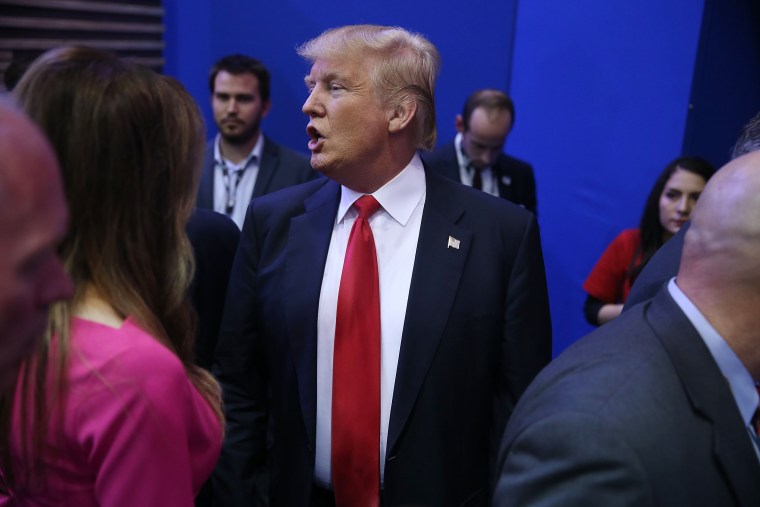Donald Trump’s campaign is built around the candidate’s constant, free-wheeling interviews with the press, but media access is far more controlled when it comes to staff and volunteers. The campaign goes to great lengths to limit unscripted interactions with Team Trump, and on Thursday, a new and unusual tactic emerged.
The Trump Campaign is now requiring some volunteers to sign Non-Disclosure Agreements before they can help the campaign – agreements that would theoretically allow Trump to sue volunteers for talking about the campaign and a process that some legal experts say is unusual and probably unenforceable.
And the tactic provides a glimpse inside a tightly-controlled Trump campaign operation where nearly every interaction with the media is funneled through the candidate’s top echelon and campaign volunteers at a loss to answer even the most elementary requests.
In a Thursday email inviting supporters for phone-banking at Trump Tower, the campaign tells supporters to attend a briefing and then “sign your NDA” before volunteering begins.
Non-Enforceable Non-Disclosures
Typically, NDAs allow employers to protect specific information held by employees – who are paid for that restriction – not volunteers on a political campaign. “This sort of an agreement would not be enforceable,” says employment lawyer Davida Perry.
“There can’t be a contract without consideration,” she told NBC, “his campaign isn’t giving the volunteer anything in exchange for their agreement to not speak about what they see or hear.”
The basic notion of a campaign drafting contracts so it could sue volunteers for discussing the campaign, Perry added, was “outrageous” and “highly unusual for the political process.”
An NDA for volunteers would be hard to enforce because they aren’t getting anything “in return” from the campaign, says professor Samuel Estreicher, who directs the labor program at NYU Law School. Trump would also struggle to prove a legal injury caused by volunteers talking, he noted.
“It’s overkill,” Estreicher told NBC News, “I don’t think it’s enforceable, I don’t know why he is doing it.”
Another employment lawyer, Jeanne Christensen, says that because volunteers are donating their work for nothing, a contract attempting to legally silence them is so “so one-sided” that courts would find it “unconscionable,” and probably unenforceable.
She noted the Trump Campaign could also open itself to lawsuits arguing that some volunteers are giving up so much, they should be treated as employees. She pointed to a recent federal case in New York, a class action by former magazine interns for Hearst Corporation, which outlined when interns may obtain benefits of employees based on their work.

A Tightly Controlled PR Operation
NBC News has experienced the tightly controlled campaign structure in multiple states through the primary season, finding that seemingly every press inquiry is passed through Trump’s main spokesperson Hope Hicks, even for questions as simple as what neighborhood they might be able to find Trump supporters.
Beyond legal paperwork, Trump supporters say the campaign also asks its backers to avoid the press.
A Trump volunteer in northeastern Ohio mentioned he was instructed not to talk to the press, before talking to an NBC reporter this week for a story about Trump supporters in a heavily Democratic county. “I wanna help you guys out,” said volunteer David Moore, a former Lorain County commissioner.
Another staffer in the key state of Ohio told NBC News that local volunteers are also discouraged from talking to the press.
That approach to message control is fairly common in modern campaigns, which seek to drive one official message through the candidate and designated spokespersons, but the Trump
Campaign’s approach is increasingly drawing scrutiny for its severity and, some say, a mean streak.
The president of the White House Press Association, Carol Lee, released a general statement Thursday about the “rhetoric aimed at reporters” that seemed to address Trump, without naming him.
Lee said the association was “increasingly concerned” with that rhetoric, and it condemned “any act of violence or intimidation against any journalist covering the 2016 campaign,” be it from a campaign’s “supporters, staff or security officers.”
The statement comes amidst a dispute over a physical altercation with a reporter and Trump’s campaign manager. Michelle Fields, a reporter for the conservative site Breitbart, says campaign manager Corey Lewandowski aggressively grabbed her while she tried to question Trump – the altercation was documented by the Washington Post and in an audio recording, while Lewandowksi denies it and Trump says the reporter “made the story up.”
The controversy took another turn Friday, when Fields reportedly filed a police report against Lewandowski.


